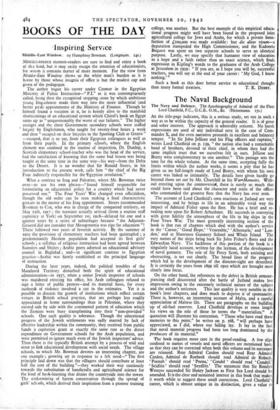BOOKS OF THE DAY .
'Inspiring Service
Middle-East Window. isy Humphrey Bowman. (Longmans. 145.)
MISCELLANEOUS memoir-readers are sure to find and enjoy a book of this kind, but it may easily escape the attention of educationists, for venom it contains matter of more moment. For the view from Mzddle-East Window shows us the white man's burden as it is borne by those whose insignia of office is but the modest cap and gown of the pedagogue.
The author began his career under Cromer in the Egyptian Ministry of Pubiic Instruction—" P.I." as it was contemptuously called, being then the recognised stepping -stone by which ambitious young Eng.ishinen made their way into the more influential (and better paid) appointments of the Ministry of Finance. Though he himselt found a vocation in it, he is keenly alive to the manifold shortcomings of an educational system which Chirol's book on Egypt sums up as " unquestionably the worst of our failures." The higher colleges and the three Government secondary schools were staffed largely by Englishmen, who taught for twenty-four hours a week and then " escaped on their bicycles to the Sporting Club at Gezira " —escaped, that is to say, from their Egyptian colleagues as well as from their pupils. In the primary schools, where the English element was confined to the routine of inspection, Dr. Dunlop, a Scottish elementary school-teacher who was the head of the service, had the satisfaction of knowing that the same bad lesson was being taught at the same time in the same way—his way—from the Delta to the Desert. It is no wonder that Sir Ronald Storrs, in his introduction to the present work, calls him " the chief of the Big Four indirectly responsible for the •Egyptian revolution."
What a contrast to Iraq and Palestine, where Mr. Bowman twice over—to use his own phrase—" found himself responsible for formulating an educational policy for a country which' had never possessed one." The Four Years' War changed even officialdom, though the old order can be seen making a final characteristic gesture in the matter of his Iraq appointment. Storrs recommended Bowman to Cox, who was in charge of the conquered territory, on May 15th, 1917 ; the nominee actually arrived (from a routine staff captaincy at York) on September 1st, 1918—delayed for one and a quarter years by a series of subterfuges because " the Adjutant- General did not consider that Mesopotamia was ripe for education "! There followed two years of feverish activity. By the summer of 1920 the provision of elementary teachers had been quintupled ; a predominantly Moslem population had accepted its first girls' schools ; a syllabus of religious instruction had been agreed between Sunnites and Shiites ; Arabic poets adorned an educational advisory council in Baghdad ; and—in significant contrast to Egyptian practice—Arabic was firmly established as the principal language of instruction.
During the later years, indeed, the political troubles of the Mandated Territory disturbed both the spirit of educational administration—in 1937, when a senior Jewish inspector of schools was murdered entering his office, his Arab colleagues refused to sign a letter of public protest—and its material basis, for every outbreak of violence involved a cut in the estimates. Yet it is possible to discern the growth of institutions which reflect certain virtues in British school practice, that are perhaps less readily appreciated in home surroundings than in Palestine, where they existed side by side with the continental pattern of education which the Zionists were busy transplanting into their "non-provided " schools. One such quality is tolerance. Though the educational progress of the Jewish settlements was sadly marred by lack of effective leadership within the community, they received from public funds a capitation grant at exactly the same rate as the direct expenditure on Government schools for the Arab population, and were permitted to ignore much even of the Jewish inspectors' advice. Then there is the typically British attempt by a process of trial and error to link educational development with social needs. The village schools, to which Mr. Bowman devotes an interesting chapter, are one example ; growing up in response to a felt need—" The first principle laid down was that the villagers should contribute at least half the cost of the building "—they worked their way cautiously towards the substitution of handicrafts and agricultural science for the kind of book-learning that drains the countryside into the towns. The undermining of harem conservatism through the spread of girls' schools, which derived their inspiration from a pioneer training
college, was another. But the best example of this empirical educa- tional progress might well have been found in the proposed joint agricultural college for Jews and Arabs, for which a private bene- faction of kroo,000 was made available: but dis aliter visum—a deputation stampeded the High Commissioner, and the Kadoorie Bequest was spent on two separate schools to serve an identical purpose. Lastly, we may specify that hummer view of education as a hope and a faith rather than an exact science, which finds expression in Kipling's words to the graduates of the Arab College at Jerusalem in 1929: " If you are, as I hope you will be, successful teachers, you will say at the end of your career : 'My God, I know nothing.'"
Such a book as this does better service to educational thought


























 Previous page
Previous page